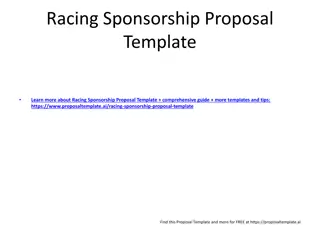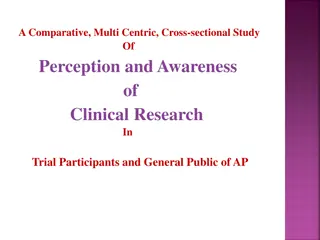Understanding Sponsorship in Clinical Research
Clinical research sponsorship is crucial for ensuring ethical, legal, and safe management of studies. The Sponsor, typically an institution, takes responsibility for overseeing various aspects of the research, including ethical standards, approvals, funding, and overall conduct. This article explores the role of a Sponsor, who qualifies as a Sponsor, and the process of obtaining Sponsor approval in the context of health and social care research. It also provides insights on seeking sponsorship at different stages of research projects.
Download Presentation

Please find below an Image/Link to download the presentation.
The content on the website is provided AS IS for your information and personal use only. It may not be sold, licensed, or shared on other websites without obtaining consent from the author. Download presentation by click this link. If you encounter any issues during the download, it is possible that the publisher has removed the file from their server.
E N D
Presentation Transcript
Sponsorship Sponsorship Paul Dearie Clinical Research Facilitation Manager
Sponsorship Sponsorship The UK Framework Policy for Health and Social Care sets out principles of good practice in the management and conduct of health and social care research. All health research involving humans, their tissue or data requires a Sponsor. This is defined in the UK Framework Policy for Health and Social Care Policy. Although the Policy specifically relates to the UK, at the University we apply these standards to all health related research.
What is a Sponsor? What is a Sponsor? A Sponsor is the institution that takes responsibility for the overall management and conduct of a study. The Sponsor has a number of responsibilities. Some examples include: Ensuring the project is ethical, legal, feasible and safe To provide insurance and indemnity for research projects Ensuring that correct approvals are in place Ensuring that sufficient funds have been secured
Who is the Sponsor? Who is the Sponsor? Students the Sponsor is usually the awarding institution (UoE). Staff the Sponsor is usually the substantive employer. As it is the responsibility of the awarding institution to provide sponsorship, UoE would be Sponsor for projects even though they are not taking place in Lothian or indeed the UK. Currently around 500 active studies. In 2021 we Sponsor reviewed 185 new studies.
Research Governance Team Research Governance Team Sponsor Representatives Representatives Sponsor Jo-Anne Robertson non regulated Chris Coner non regulated Tiago Santos all except GH Fiach O Mahony regulated Paul Dearie regulated Ellie McMaster Global Health
How to get Sponsor approval? How to get Sponsor approval? A protocol and all study related documents should be sent to resgov@accord.scot A brief CV for the Chief Investigator of the study. The expectation is that the academic supervisor is the CI for the study (not the student). ACCORD has a variety of templates that can be used for protocols, information sheets etc, found on the Researcher Access Important Documents for Researchers section of the ACCORD website (www.accord.scot). ACCORD also has a number of leaflets covering FAQs and other important sponsorship considerations, found on the Training section of the ACCORD website.
When to seek sponsorship? When to seek sponsorship? You should seek sponsorship in the early stages of study planning. If unsure send a dissertation proposal to resgov@accord.scot and we will advise. You will need Sponsor authorisation for your research study prior to seeking ethics and any other approvals.
What happens next? What happens next? The Sponsor Reviewer will assess documentation and provide a review document of comments relating to the study. The review can take approximately 10 working days. Once all comments have been addressed, the research study can be authorised for ethics submission and R&D submission or Combined Review for. Feedback from the aforementioned submissions should be discussed with your Sponsor Reviewer. Risk-assessed studies will also require separate authorisation to open from the Sponsor.
Regulated Studies Regulated Studies Usually more documents required, e.g. IB, SPC, IMPD, labels, feasibility questionnaire. Risk assessment process is initiated once documents are received and the risk assessment involves multiple departments. Once the risk assessment has been completed, the research study can be authorised for regulatory/ethics/R&D submissions. Combined Review is mandatory for CTIMPs and IMP-device combinations. It is expected to be mandatory for device investigations in future.
Amendments Amendments Documents (amended documents, amendment tool and any other relevant documents) resgov@accord.scot Classification by the Sponsor Reviewer Sponsor Reviewer will sign the amendment tool electronically before submission to the REC/R&D/MHRA Authorisation required form the Sponsor Reviewer to implement substantial amendments from risk-assessed studies.
Useful links Useful links ACCORD website: www.accord.scot - sign up to our updates Twitter: @EdinburghACCORD HRA website: https://www.hra.nhs.uk/ Any insurance questions contact: insurance@ed.ac.uk Is it research, audit or service evaluation: http://www.hra- decisiontools.org.uk/research/docs/definingresearchtable_oct2017- 1.pdf






















